Germany Legal Cannabis Market: By Source, By Derivative, By End Use, By City & Segmental Insights Trends and Forecast, 2024 – 2034
- Industry: Healthcare
- Report ID: TNR-110-1169
- Number of Pages: 420
- Table/Charts : Yes
- June, 2024
- Base Year : 2024
- No. of Companies : 10+
- No. of Countries : 29
- Views : 10231
- Covid Impact Covered: Yes
- War Impact Covered: Yes
- Formats : PDF, Excel, PPT
Legal cannabis refers to the cultivation, distribution, possession, and consumption of cannabis products in accordance with established laws and regulations within a specific jurisdiction. The legality of cannabis varies widely across countries and states, with some regions permitting its use for medical purposes, recreational use, or both. In jurisdictions where cannabis is legal, stringent regulatory frameworks govern its production, sale, and consumption to ensure safety, quality control, and compliance with public health standards.
Legalization often involves licensing authorities that oversee cultivation facilities, dispensaries, and retail operations, ensuring adherence to strict guidelines regarding product potency, labelling, and packaging. Legal cannabis markets stimulate economic growth through job creation, tax revenues, and opportunities for entrepreneurship in sectors ranging from agriculture to retail. Furthermore, legalization aims to diminish the illicit cannabis trade, promote consumer safety, and provide access to cannabis for medical patients seeking alternative treatments.
Germany’s aging population and rising prevalence of chronic diseases contribute to the growing demand for alternative therapies that cannabis can potentially address. Moreover, increasing public acceptance and awareness of cannabis’ therapeutic benefits, coupled with ongoing research highlighting its medical efficacy, further fuel demand. Additionally, the economic opportunities presented by the legal cannabis market, including job creation and tax revenues, motivate stakeholders to support its growth, ensuring a robust and expanding market for legal cannabis products in Germany. In terms of revenue, the Germany legal cannabis market was worth US$ 0.8 Bn in 2023, anticipated to witness CAGR of 17.2% during 2024 – 2034.
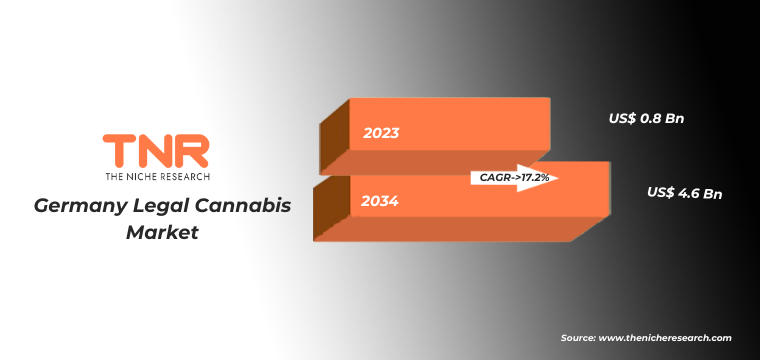
Germany Legal Cannabis Market Dynamics
Regulatory Framework: Germany’s legalization of medical cannabis in 2017 established a robust regulatory framework overseen by the Federal Institute for Drugs and Medical Devices (BfArM), ensuring controlled cultivation, distribution, and prescription of cannabis products. This clarity has facilitated market growth by providing stakeholders with clear guidelines for compliance and operation.
Growing Patient Demand: Increasing awareness of cannabis’ therapeutic benefits, coupled with a rising incidence of chronic illnesses among Germany’s aging population, has driven patient demand for medical cannabis. Patients seek alternative treatments for conditions such as chronic pain, multiple sclerosis, and epilepsy where conventional therapies have been insufficient.
Healthcare Professional Acceptance: Greater acceptance among healthcare professionals of cannabis as a viable treatment option has led to higher prescription rates. Physicians are increasingly incorporating medical cannabis into treatment plans, contributing to market expansion.
Market Expansion and Investment: The legalization has attracted investments from pharmaceutical companies and entrepreneurs, fostering market growth and innovation in cannabis-based medicines tailored to German healthcare needs.
Marijuana has Gained Popularity in the Recent Years and Has garnered major market share in the Germany Legal Cannabis Market During the Forecast Period (2024 – 2034).
The legalization of medical cannabis in 2017 marked a significant shift in policy, allowing patients with qualifying conditions such as chronic pain, nausea from chemotherapy, and certain neurological disorders to access cannabis-based treatments under medical supervision. This regulatory change has stimulated growth in the medical cannabis market, with an increasing number of patients opting for cannabis as an alternative or complementary therapy.
Secondly, there is a growing acceptance and recognition among healthcare professionals of cannabis’ therapeutic potential, leading to higher prescription rates and patient registrations with the Federal Institute for Drugs and Medical Devices (BfArM). Additionally, Germany’s progressive stance on cannabis research and development has attracted investments from pharmaceutical companies and fostered innovation in cannabis-based medicines. Lastly, public education initiatives and evolving consumer attitudes towards natural and alternative therapies further contribute to the expanding demand for legal cannabis products in Germany.
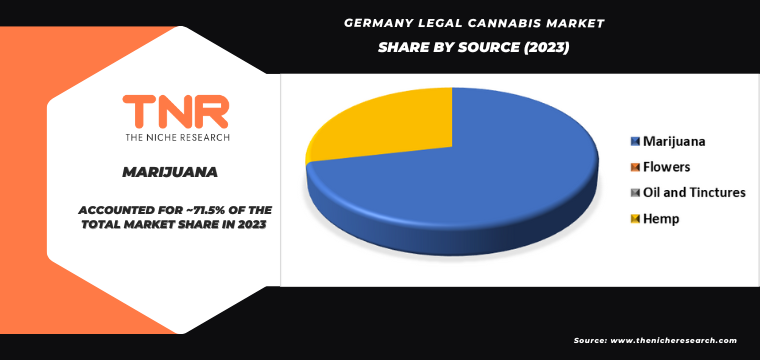
By Derivative CBD Segment had the Highest Share in the Germany Legal Cannabis Market in 2023.
In Germany, the medical use of CBD (cannabidiol) within the framework of legal cannabis regulations is driven by several significant factors. Firstly, CBD has gained popularity among healthcare professionals and patients for its potential therapeutic benefits, including its anti-inflammatory, analgesic, and anxiolytic properties. The legalization of medical cannabis in 2017 has paved the way for CBD-containing products to be prescribed for various conditions such as chronic pain, anxiety disorders, and epilepsy.
The regulatory clarity provided by Germany’s Federal Institute for Drugs and Medical Devices (BfArM) has facilitated easier access to these treatments, leading to a surge in prescriptions and patient registrations. Furthermore, increasing public awareness and acceptance of CBD’s medical potential, coupled with a growing body of scientific research supporting its efficacy, continue to drive demand. The evolving regulatory landscape and ongoing clinical trials exploring new therapeutic applications of CBD further contribute to the expanding market for medical CBD products in Germany’s healthcare sector.
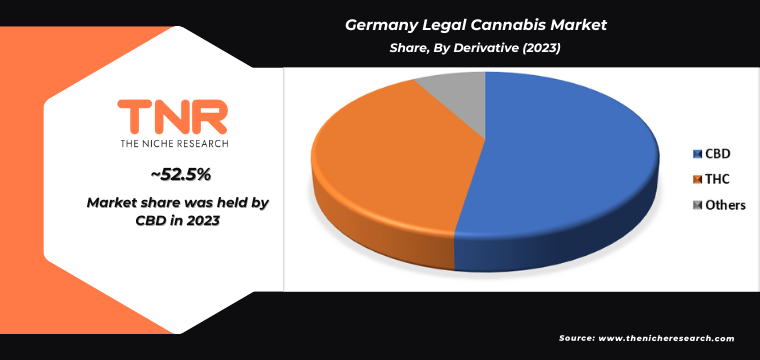
By End Use Medical Use had the Highest Share in the Germany Legal Cannabis Market in 2023.
In Germany, the medical use of legal cannabis is driven by several key factors. Firstly, there is a growing recognition among healthcare professionals of the therapeutic benefits of cannabis-based medicines in treating various medical conditions, including chronic pain, multiple sclerosis (MS), and certain forms of epilepsy. The legalization and regulation of medical cannabis in 2017 have facilitated broader access to these treatments, prompting an increase in prescriptions and patient registrations with the Federal Institute for Drugs and Medical Devices (BfArM).
Moreover, Germany’s aging population and rising prevalence of chronic illnesses have heightened demand for alternative therapies, where cannabis products offer a promising option for symptom management and improving quality of life. Additionally, patient advocacy groups and medical research continue to support the expansion of approved indications and the development of new cannabis-based medications, further driving the demand for legal medical cannabis in Germany’s healthcare system.
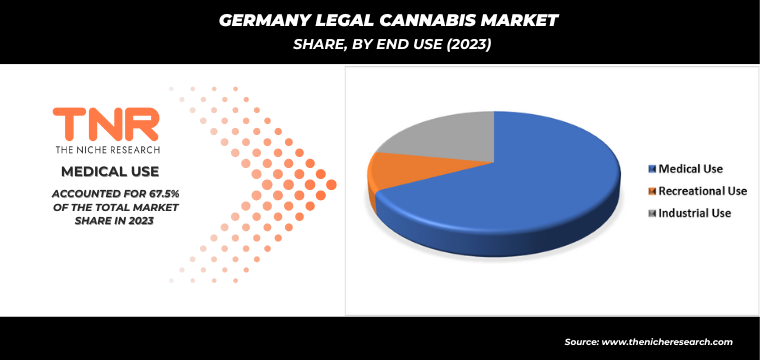
Competitive Landscape: Germany Legal Cannabis Market:
- Aphria, Inc.
- Aurora Cannabis, Inc.
- Canopy Growth Corporation
- Cara Therapeutics Inc.
- Cronos Group
- GW Pharmaceuticals, plc
- Insys Therapeutics, Inc.
- Sundial Growers Inc.
- The Scotts Company LLC
- Tilray
- VIVO Cannabis Inc.
- Other Industry Participants
Germany Legal Cannabis Market Scope
| Report Specifications | Details |
| Market Revenue in 2023 | US$ 0.8 Bn |
| Market Size Forecast by 2034 | US$ 4.6 Bn |
| Growth Rate (CAGR) | 17.2% |
| Historic Data | 2016 – 2022 |
| Base Year for Estimation | 2023 |
| Forecast Period | 2024 – 2034 |
| Report Inclusions | Market Size & Estimates, Market Dynamics, Competitive Scenario, Trends, Growth Factors, Market Determinants, Key Investment Segmentation, Product/Service/Solutions Benchmarking |
| Segments Covered | By Source, By Derivative, By End Use, By City |
| Cities Covered | Berlin, Hamburg, Munich, Koeln, Frankfurt am Main, Rest of Germany |
| Key Players | Aphria, Inc., Aurora Cannabis, Inc., Canopy Growth Corporation, Cara Therapeutics Inc., Cronos Group, GW Pharmaceuticals, plc, Insys Therapeutics, Inc., Sundial Growers Inc., The Scotts Company LLC, Tilray, VIVO Cannabis Inc. |
| Customization Scope | Customization allows for the inclusion/modification of content pertaining to geographical regions, countries, and specific market segments. |
| Pricing & Procurement Options | Explore purchase options tailored to your specific research requirements |
| Contact Details | Consult With Our Expert
Japan (Toll-Free): +81 663-386-8111 South Korea (Toll-Free): +82-808- 703-126 Saudi Arabia (Toll-Free): +966 800-850-1643 United Kingdom: +44 753-710-5080 United States: +1 302-232-5106 E-mail: askanexpert@thenicheresearch.com
|
Germany Legal Cannabis Market
By Source
- Marijuana
- Flowers
- Oil and Tinctures
- Hemp
- Hemp CBD
- Supplements
- Industrial Hemp
By Derivative
- CBD
- THC
- Others
By End Use
- Medical Use
- Cancer
- Chronic Pain
- Depression and Anxiety
- Arthritis
- Diabetes
- Glaucoma
- Migraines
- Epilepsy
- Multiple Sclerosis
- AIDS
- Amyotrophic Lateral Sclerosis
- Alzheimer’s
- Post-Traumatic Stress Disorder (PTSD)
- Parkinson’s
- Tourette’s
- Others
- Recreational Use
- Industrial Use
By City
- Berlin
- Hamburg
- Munich
- Koeln
- Frankfurt am Main
- Rest of Germany
Report Layout:
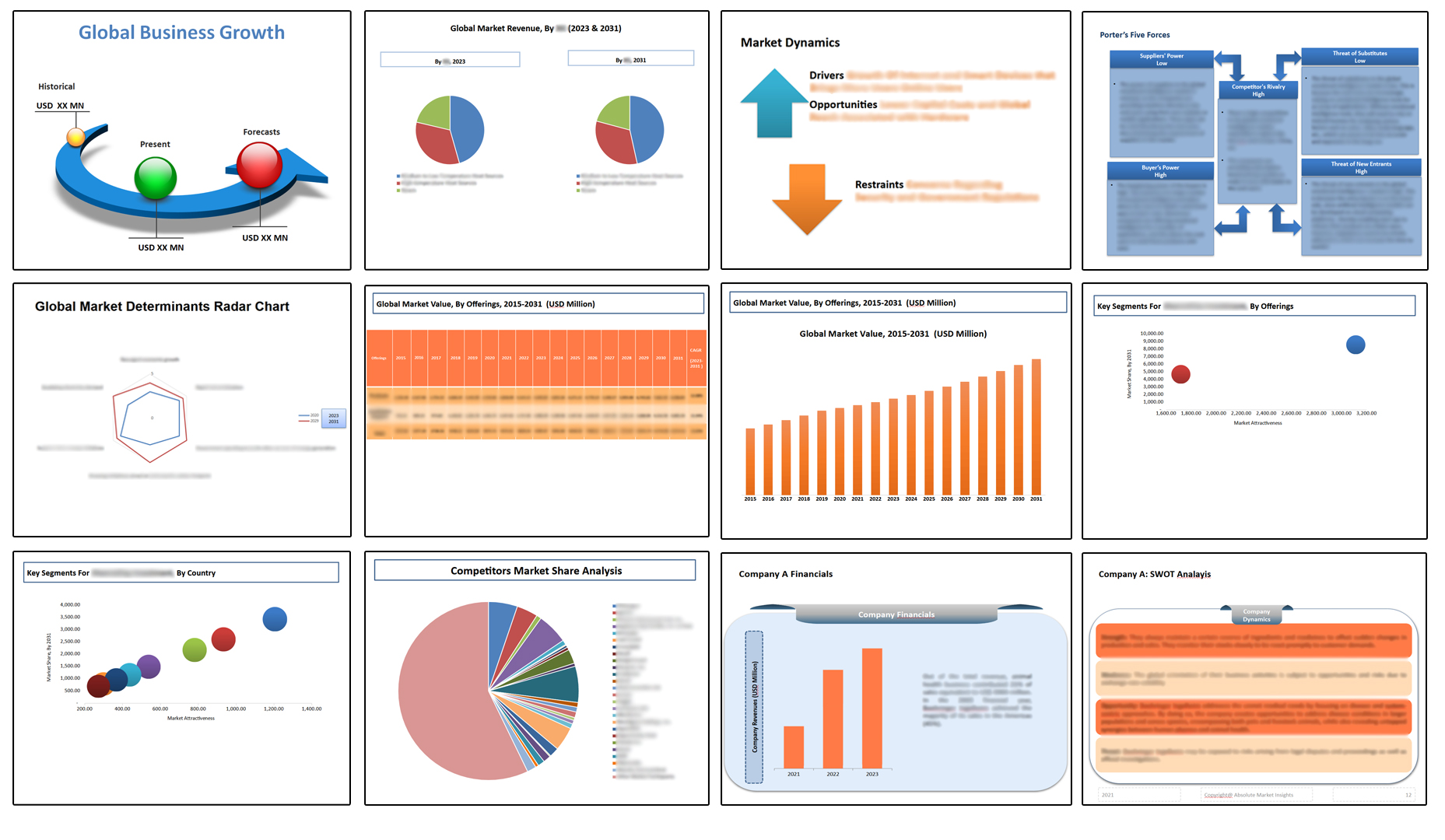
Table of Contents
Note: This ToC is tentative and can be changed according to the research study conducted during the course of report completion.
**Exclusive for Multi-User and Enterprise User.
Germany Legal Cannabis Market
By Source
- Marijuana
- Flowers
- Oil and Tinctures
- Hemp
- Hemp CBD
- Supplements
- Industrial Hemp
By Derivative
- CBD
- THC
- Others
By End Use
- Medical Use
- Cancer
- Chronic Pain
- Depression and Anxiety
- Arthritis
- Diabetes
- Glaucoma
- Migraines
- Epilepsy
- Multiple Sclerosis
- AIDS
- Amyotrophic Lateral Sclerosis
- Alzheimer’s
- Post-Traumatic Stress Disorder (PTSD)
- Parkinson’s
- Tourette’s
- Others
- Recreational Use
- Industrial Use
By City
- Berlin
- Hamburg
- Munich
- Koeln
- Frankfurt am Main
- Rest of Germany
The Niche Research approach encompasses both primary and secondary research methods to provide comprehensive insights. While primary research is the cornerstone of our studies, we also incorporate secondary research sources such as company annual reports, premium industry databases, press releases, industry journals, and white papers.
Within our primary research, we actively engage with various industry stakeholders, conducting paid interviews and surveys. Our meticulous analysis extends to every market participant in major countries, allowing us to thoroughly examine their portfolios, calculate market shares, and segment revenues.
Our data collection primarily focuses on individual countries within our research scope, enabling us to estimate regional market sizes. Typically, we employ a bottom-up approach, meticulously tracking trends in different countries. We analyze growth drivers, constraints, technological innovations, and opportunities for each country, ultimately arriving at regional figures.Our process begins by examining the growth prospects of each country. Building upon these insights, we project growth and trends for the entire region. Finally, we utilize our proprietary model to refine estimations and forecasts.
Our data validation standards are integral to ensuring the reliability and accuracy of our research findings. Here’s a breakdown of our data validation processes and the stakeholders we engage with during our primary research:
- Supply Side Analysis: We initiate a supply side analysis by directly contacting market participants, through telephonic interviews and questionnaires containing both open-ended and close-ended questions. We gather information on their portfolios, segment revenues, developments, and growth strategies.
- Demand Side Analysis: To gain insights into adoption trends and consumer preferences, we reach out to target customers and users (non-vendors). This information forms a vital part of the qualitative analysis section of our reports, covering market dynamics, adoption trends, consumer behavior, spending patterns, and other related aspects.
- Consultant Insights: We tap into the expertise of our partner consultants from around the world to obtain their unique viewpoints and perspectives. Their insights contribute to a well-rounded understanding of the markets under investigation.
- In-House Validation: To ensure data accuracy and reliability, we conduct cross-validation of data points and information through our in-house team of consultants and utilize advanced data modeling tools for thorough verification.
The forecasts we provide are based on a comprehensive assessment of various factors, including:
- Market Trends and Past Performance (Last Five Years): We accurately analyze market trends and performance data from preceding five years to identify historical patterns and understand the market’s evolution.
- Historical Performance and Growth of Market Participants: We assess the historical performance and growth trajectories of key market participants. This analysis provides insights into the competitive landscape and individual company strategies.
- Market Determinants Impact Analysis (Next Eight Years): We conduct a rigorous analysis of the factors that are projected to influence the market over the next eight years. This includes assessing both internal and external determinants that can shape market dynamics.
- Drivers and Challenges for the Forecast Period:Identify the factors expected to drive market growth during the forecast period, as well as the challenges that the industry may face. This analysis aids in deriving an accurate growth rate projection.
- New Acquisitions, Collaborations, or Partnerships: We keep a close watch on any new acquisitions, collaborations, or partnerships within the industry. These developments can have a significant impact on market dynamics and competitiveness.
- Macro and Micro Factors Analysis:A thorough examination of both macro-level factors (e.g., economic trends, regulatory changes) and micro-level factors (e.g., technological advancements, consumer preferences) that may influence the market during the forecast period.
- End-User Sentiment Analysis: To understand the market from the end-user perspective, we conduct sentiment analysis. This involves assessing the sentiment, preferences, and feedback of the end-users, which can provide valuable insights into market trends.
- Perspective of Primary Participants: Insights gathered directly from primary research participants play a crucial role in shaping our forecasts. Their perspectives and experiences provide valuable qualitative data.
- Year-on-Year Growth Trend: We utilize a year-on-year growth trend based on historical market growth and expected future trends. This helps in formulating our growth projections, aligning them with the market’s historical performance.
Research process adopted by TNR involves multiple stages, including data collection, validation, quality checks, and presentation. It’s crucial that the data and information we provide add value to your existing market understanding and expertise. We have also established partnerships with business consulting, research, and survey organizations across regions and globally to collaborate on regional analysis and data validation, ensuring the highest level of accuracy and reliability in our reports.









